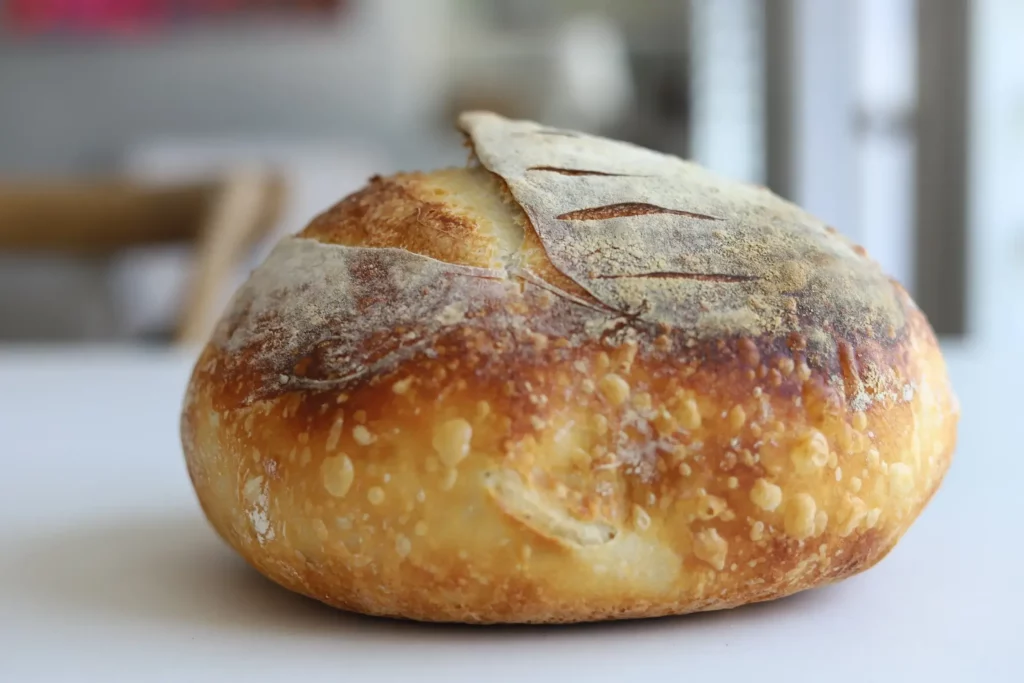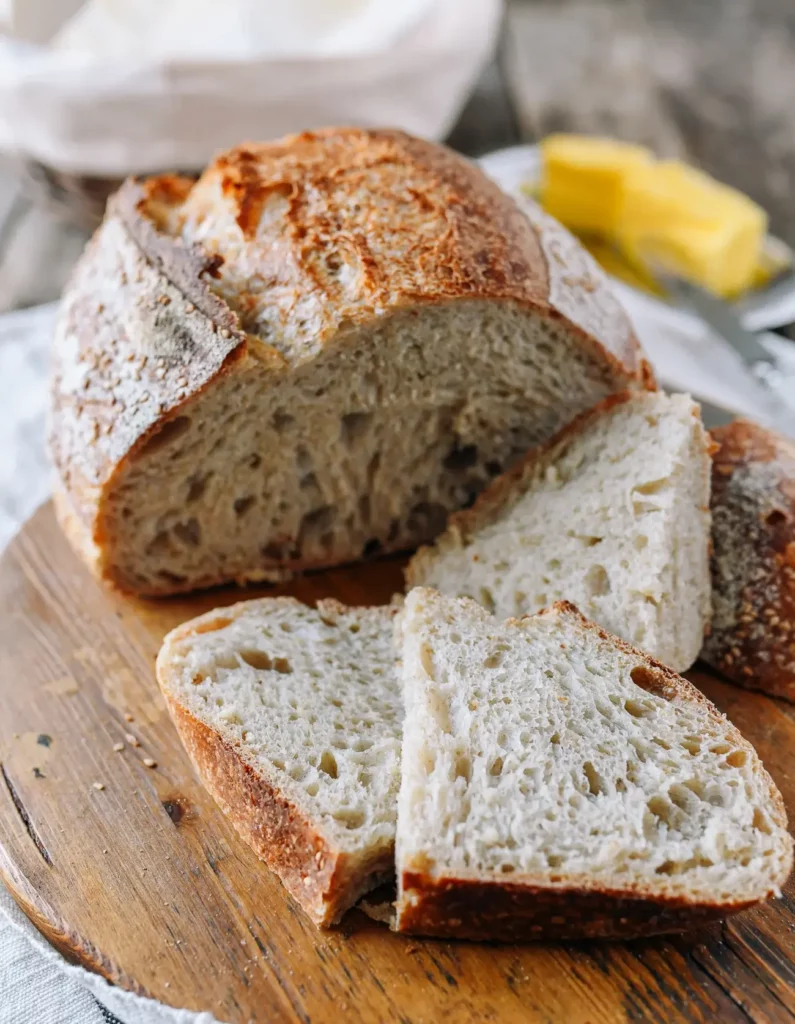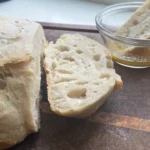Are you ready to embark on a journey of culinary mastery? Look no further than this artisan sourdough bread recipe, where the Dutch oven becomes your trusty companion in creating the perfect loaf.
Join us as we guide you through the art of mixing, fermenting, and baking, unlocking the secrets to achieving that coveted crust and airy crumb.
Get ready to experience the freedom of homemade bread that will have your taste buds singing with delight.
Contents
- 1 Key Takeaways
- 2 Ingredients
- 3 Mixing the Dough
- 4 Fermentation and Proofing
- 5 Preparing the Dutch Oven
- 6 Baking the Sourdough Bread
- 7 Frequently Asked Questions
- 7.1 How Long Does It Take to Make Artisan Sourdough Bread From Start to Finish?
- 7.2 Can I Use a Different Type of Flour for This Recipe?
- 7.3 Can I Add Additional Ingredients, Such as Herbs or Cheese, to the Dough?
- 7.4 How Do I Know When the Dough Has Fermented and Proofed Long Enough?
- 7.5 Can I Use a Different Type of Baking Vessel if I Don’t Have a Dutch Oven?
- 8 What Makes the Dutch Oven Method Ideal for Baking Sourdough Bread?
- 9 Conclusion
Key Takeaways
- Choose the right type of flour for your sourdough bread, such as bread flour, whole wheat flour, or rye flour.
- Ensure your sourdough starter is active and bubbly before using it in the recipe.
- Experiment with different flour combinations to create unique flavors and textures in your bread.
- Preheat the Dutch oven and use a parchment paper sling to achieve a crispy crust and soft, chewy interior.
Ingredients
To begin making artisan sourdough bread in a Dutch oven, gather all of your ingredients.
When it comes to flour types, you have a few options. The most common flour used in sourdough bread is bread flour, which has a higher protein content and helps create a chewy texture. However, you can also experiment with other types of flour, such as whole wheat or rye, to add different flavors and textures to your bread.
As for sourdough starter maintenance, ensure that your starter is active and bubbly before using it in your bread recipe. Feed it regularly with equal parts flour and water to keep it alive and maintain a robust fermentation process.
Mixing the Dough
Start by measuring out the appropriate amount of flour and water for your sourdough bread dough. This step is crucial in achieving the perfect texture and flavor in your bread. Once you have the ingredients ready, it’s time to mix the dough. Here’s how:
- Combine the flour and water in a large mixing bowl.
- Use your hands or a wooden spoon to mix the ingredients together until they form a shaggy dough.
- Let the dough rest for 30 minutes to an hour. This will allow the flour to fully hydrate and make it easier to knead.
When it comes to the kneading technique, there are different approaches you can take. Some bakers prefer the traditional method of hand kneading, while others opt for a no-knead technique that involves longer fermentation times. Experiment with different methods to find the one that suits your preferences.
Remember to also consider the types of flour you use. Different flours, such as all-purpose, bread flour, or whole wheat, will yield different results in terms of texture and flavor. Don’t be afraid to mix and match to discover your favorite combination.
Enjoy the freedom of creating your own unique sourdough bread by mastering the art of mixing the dough.
Fermentation and Proofing
Now it’s time for you to let the dough ferment and proof to develop its flavor and texture. Fermentation and proofing are crucial steps in the bread-making process that allow the dough to rise and develop its characteristic taste and texture. During fermentation, the yeast in the dough consumes the sugars and produces carbon dioxide, which creates air bubbles and causes the dough to rise. This process also helps to develop the complex flavors in the bread. Proofing, on the other hand, is the final rise before baking, allowing the dough to relax and expand further. To help you better understand the science behind fermentation and proofing, here is a table outlining the key factors and troubleshooting common issues:
| Fermentation | Proofing |
|---|---|
| Temperature | Temperature |
| Time | Time |
| Starter | Shaping |
| Dough hydration | Humidity |
Preparing the Dutch Oven
To prepare your Dutch oven for baking the artisan sourdough bread, begin by preheating it in your oven. This step is crucial for achieving that perfect crust and soft, chewy interior.
Here are some tips to properly preheat your Dutch oven:
- Choose the right Dutch oven: There are various types of Dutch ovens available for baking bread, such as cast iron or enameled cast iron. Each type has its own advantages, so choose the one that suits your needs.
- Preheat at the right temperature: Set your oven to a high temperature, around 450-500°F (230-260°C), and preheat your Dutch oven inside for at least 30 minutes. This ensures that the oven and the pot are evenly heated.
- Use a parchment paper sling: To easily transfer your dough into the hot Dutch oven, line it with parchment paper and create a sling. This will help you lower the dough gently without burning yourself.
Following these tips will help you achieve a beautifully baked artisan sourdough bread with a crispy crust and a soft, airy crumb.
Enjoy the freedom of creating your own homemade bread!
Baking the Sourdough Bread
Begin by preheating your Dutch oven in the oven at a high temperature for at least 30 minutes, ensuring it’s evenly heated. This step is crucial for achieving that perfect crust and even baking of your artisan sourdough bread.
While the Dutch oven is preheating, take a moment to review some helpful kneading techniques. Kneading is an essential part of the bread-making process as it helps develop gluten, resulting in a light and airy texture.
Troubleshooting common issues during the baking process is also important. If your bread isn’t rising enough or has a dense texture, it could be due to under-kneading or insufficient proofing. On the other hand, if your bread is too dry or has a tough crust, it may be a result of over-kneading or overbaking.
Frequently Asked Questions
How Long Does It Take to Make Artisan Sourdough Bread From Start to Finish?
To make artisan sourdough bread from start to finish, it will take some time and patience. But don’t worry, the advantages of using a dutch oven for baking sourdough bread and tips for achieving a crispy crust will make it worth it.
Can I Use a Different Type of Flour for This Recipe?
Sure, you can definitely use a different type of flour for this recipe! If you want a gluten-free option, go for alternative flours like rice flour or almond flour. You can also experiment with different flours to add unique flavors to your bread. Enjoy the freedom to get creative!
Can I Add Additional Ingredients, Such as Herbs or Cheese, to the Dough?
Adding herbs or cheese to the dough can enhance the flavor and texture of your artisan sourdough bread. The herbs will infuse their aromatic essence, while the cheese will melt and create pockets of gooey goodness. Get creative and enjoy!
How Do I Know When the Dough Has Fermented and Proofed Long Enough?
To test if your dough has fermented and proofed long enough, look for signs of proper fermentation like an increase in volume, a bubbly texture, and a tangy smell. Also, gently poke the dough with your finger. If it springs back slowly, it’s ready!
Can I Use a Different Type of Baking Vessel if I Don’t Have a Dutch Oven?
If you don’t have a Dutch oven, no worries! There are alternative baking vessels you can use for your artisan sourdough bread. Try using a cast iron skillet or a baking stone with a steam pan for a similar effect. Enjoy your freedom in the kitchen!
What Makes the Dutch Oven Method Ideal for Baking Sourdough Bread?
The Dutch oven method is ideal for baking sourdough bread because it creates the perfect environment for a crispy crust and a soft, moist interior. When following the ballerina farms sourdough bread recipe, using a Dutch oven helps to trap steam and heat, resulting in a beautifully risen loaf with irresistible texture.
Conclusion
So there you have it, a simple and delicious artisan sourdough bread recipe that you can easily make in a Dutch oven.
Don’t worry if you’re new to baking bread, this recipe is beginner-friendly and the step-by-step directions will guide you through the process.
And if you’re thinking that making bread from scratch is too time-consuming, just remember that the majority of the time is spent letting the dough ferment and proof, so you can easily fit it into your schedule.
Give it a try and enjoy the satisfaction of baking your own homemade sourdough bread.





